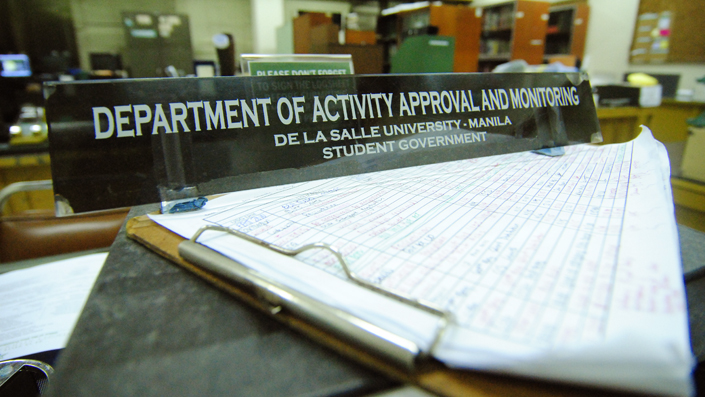As a representative body, which aims to serve the student body, the University Student Government (USG) holds activities for personal development, awareness, and social involvement. Activities range from exhibits and seminars to tours and programs designed to address the specific needs of students.
Every day, college governments and the different USG offices have activities that fall in the aforementioned range. The rise in number of student activities in recent years has posed a monitoring challenge to the USG in recent years.
The Department of Activity Approval and Monitoring (DAAM) was created to ensure that USG unit activities remain in line with the principles and mission of the USG. Under the organization chart of the USG, the DAAM is under the Office of the Vice President of Internal Affairs whose main task is to approve and monitor student activities.

The process
Implementation of activities and projects, whether short-term or long-term, require have to undergo a stringent process. At the start of the term, officers prepare a lineup of activities for the term or formally known as Goals, Objectives, Strategies, and Measures (GOSM) to submit to DAAM for approval.
Officers are then required to pass pre-activity requirements prior to the execution of a project, which include an explanation of the objectives of an activity and other important details such as the breakdown of expenses that would be incurred in its execution.
The DAAM does not follow specific criteria in approving activities. DAAM Chair Bea Guingona, however, explains that approval depends on the feasibility and objectives of the activities. They must be relevant and should address the needs of the students.
DAAM generally approves only internal activities of the USG. External activities are left to the discretion of the Office of Student Leadership, Involvement, Formation and Empowerment (S-LIFE).
Once an activity is approved, it may now be implemented. After the activity takes place, USG units then have to pass midterm and term-end reports, which should contain post-activity reports for evaluation purposes. DAAM has set this requirement to determine whether activity objectives are met. Reports are compiled in a CD and passed to S-LIFE for reference and future PAASCU accreditations.
The Vice President for Internal Affairs appoints and chooses the DAAM members, who cannot be USG officers. Each college has a DAAM representative, assigned to approve activities and to evaluate them.
Moreover, every USG unit has members directly responsible for the submission of requirements to the DAAM. Project heads, on the other hand, are tasked to submit the documents.
Evaluation
This year, DAAM changed some of its processes. The unit has opted to receive post-activity requirements online. Moreover, DAAM has improved its communication mechanism with USG officers to constantly remind the latter about important deadlines.
College of Education College President Monica Dumaual attests that DAAM has been successful in promoting transparency and accountability among officers. She explains that the unit has encouraged them to conduct thorough planning to accomplish the objectives of her college’s activities.
School of Economics College President Kaila Astorga affirms that DAAM has improved its performance in contrast to the unit’s performance last year. Its approval process is now faster and more efficient.
Although DAAM has shown progress in approving USG activities, it still has room for improvement in monitoring activities. FAST2011 President Angelo Tiglao questions the effectiveness of the monitoring acts of DAAM as the results of the evaluation of activities are not disclosed to officers. Internal assessment is then difficult to conduct.
“In the scale of one to 10 with 10 being the highest, I would rate DAAM a seven. Although efficient approval is a big plus, when we forget to report monitoring, there comes a problem,” adds Tiglao.
Guingona mentions that the main problem of the department lies in the punctuality of submission of requirements. In some instances, officers do not meet the set deadline. To address this, the department has resolved to impose penalties for late submission. Sanctions may be in the form of suspension of activities or withholding of activities for the next term.
In line with this, College of Liberal Arts College President Raymund Nejal suggests that deadlines should be set earlier in the term to encourage USG officers to comply.
